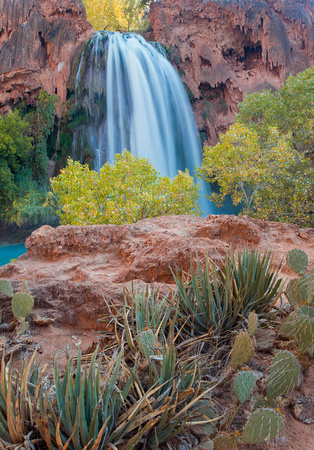Havasu Falls cactus
Havasu Falls is the second waterfall in the canyon. It is located at 36°15′18″N 112°41′52″W / 36.255°N 112.69778°W / 36.255; -112.69778 (1 ½ miles from Supai) and is accessed from a trail on the right side (left side when heading upstream) of the main trail. The side trail leads across a small plateau and drops into the main pool. Havasupai is arguably the most famous and most visited of all the falls, and is considered one of the most photographed waterfalls in the world. The falls consist of one main chute that drops over a 120-foot (37 m) vertical cliff (due to the high mineral content of the water, the falls are ever-changing and sometimes break into two separate chutes of water) into a large pool.
The falls are known for their natural pools, created by mineralization, although most of these pools were damaged and/or destroyed in the early 1990s by large floods that washed through the area. A small man-made dam was constructed to help restore the pools and to preserve what is left. There are many picnic tables on the opposite side of the creek and it is very easy to cross over by following the edges of the pools. It is possible to swim behind the falls and enter a small rock shelter behind it.


